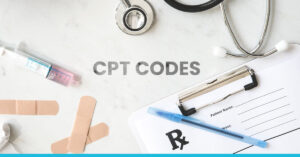
According to a survey by Beckers Hospital Review, almost 80% of all medical bills contain some sort of medical billing error. No matter how hard you try, mistakes are bound to occur. Unfortunately, these mistakes come at the cost of lost revenue and could be the difference between whether a healthcare provider gets reimbursed for their services or not.
Since mistakes in medical billing can be extremely detrimental to your practice’s net income, it is a medical biller’s responsibility to ensure that medical billing errors are minimized at all costs.
In this article, we take a look at the most common medical billing errors made by practices across the country and how your practice can avoid them.
5 Most Common Medical Billing Errors
- Incorrect CPT Codes
Inaccurate coding is one of the most common causes of claim denials in medical practices. Errors in coding can impact your practice’s profit significantly. Just one wrong number entered into the system can mean an entirely different procedure was documented instead of the procedure that was performed. This will eventually lead to delays in reimbursement or worse – claim denials.
There are several types of errors in medical coding. Here are the most common types:
- Undercoding
This is when a medical biller fails to bill the patient or insurer for the entire range of services that were offered to the patient. Under coding means lost revenue that can significantly impact your revenue cycle.
- Overcoding
Overcoding is when a practice exaggerates the services that are provided to the patient and bills them for a higher amount than what they are entitled to pay. Overcoding may even result in legal issues.
- Mismatch
This is another common medical billing error where two items on a patient’s bill don’t match, such as their treatment and their diagnosis. Imagine this: patient A is diagnosed with cancer but on their medical bill, they are billed for drugs that are used to treat diabetes. You can only imagine how confused the patient might be, knowing that they do not have diabetes.
Errors in medical coding can only be avoided by making sure that you are thorough with your coding process. If you notice that your organization is receiving several claim denials, you may want to check up on your coding process. There may be a chance that your employees may not be following the right rules of medical coding.
To ensure that your staff uses the right codes for the right procedures, it is your responsibility to train them on the accurate coding rules. Also, make sure that you always have a list of all the updated CPT codes in your workplace that your staff can refer to whenever they are confused about which code to document.
Outsourcing your medical coding can also help you reduce the risk of medical billing errors significantly. Third-party medical billing companies such as Precision Hub are dedicated to improving your net income by enhancing accuracy so that you can focus on what matters the most: providing quality patient care.
- Incorrect or Incomplete Patient Data
Issues with patient data are another common medical billing error, especially in organizations that have a very high volume of patients. Keeping up with a large number of patients can be extremely taxing and can lead to multiple discrepancies in their data. Errors in patient data or missing data can also be caused by malware attacks on your system.
Errors in patient data can lead to large volumes of claim denials which may be extremely detrimental to your practice’s revenue stream. To sidestep patient data issues, make sure to cross-check their data with them before storing it on your EHR system. This includes double-checking their medical history, insurance provider and policy, name, address, contact details, and any other relevant data.
- Insurance Verification
Not verifying your patients’ insurance is one of the most common causes of medical billing errors in healthcare. When faced with a high patient volume, several healthcare practices forget to verify their patients’ insurance policies. While this may seem like an efficient effort, not verifying your patients’ insurance eligibility can cost you significantly in the long run.
If your patient’s insurance policy does not align with the services that have been rendered to them, the insurance company will not reimburse you. This is why it is so crucial that you verify your patients’ insurance eligibility before providing any services to them. Although you won’t face any legal issues by not verifying your patients’ insurance policy, you’ll end up costing your practice a lot of money.
- Claims Sent to The Wrong Insurance Company
Another common medical billing error that healthcare practices tend to make is sending the insurance claim to the wrong insurance provider. This error tends to occur when you don’t have a copy of the patient’s insurance card or you don’t pay enough attention while entering the patient’s insurance information into your electronic healthcare records. This may also lead to the violation of the payer-patient contract by rendering them services that are not covered by their insurance company or using the services of an out-of-network provider.
To avoid this commonly made medical billing error, it’s best if you always request the patient to provide you with a copy of their insurance card. This allows your front-end staff to ensure that they always enter the right insurance company’s name in the patients’ electronic healthcare records.
- Missing or Poor Documentation
One source of a common medical billing error that several practices make is poor documentation from the healthcare provider’s end. If the physician or healthcare provider does not provide substantial information or leaves out crucial information about the procedure they have performed, the medical coder is unable to code for the services properly. In this case, unless the medical coder can reach out to the healthcare provider directly for more information, they may end up submitting an incorrect claim. The insurance provider will then reject or deny this claim and not reimburse you for the services that you provided.
To tackle the issue of poor or incomplete documentation, providers should be given the necessary education on how to accurately document a procedure. Certain standards should be set to ensure that all documentation is clear, specific, and complete. Hiring a well-educated team of dedicated physicians who are quick with technology is also critical to ensuring the quality of your practice’s clinical documentation.
If you feel that the documentation in your practice is falling short, consider undergoing a gap analysis. A gap analysis involves looking at the documentation both before and after the procedure is performed and analyzing to see where it stands compared to other healthcare organizations that offer the same services.
See Also: Protect Yourself From Surprise Medical Bills
The Bottom Line
While mistakes can be detrimental to your revenue cycle, they’re bound to occur. What truly matters are the steps you take to minimize the medical billing errors in your revenue cycle process. Outsourcing your medical billing to a third-party provider can help you significantly eliminate the risk of billing errors which ultimately boosts your revenue stream. Third-party medical billing providers such as Precision Hub follow a streamlined approach to the revenue cycle that is designed to increase your cash flow, reduce costs, and enhance clean claim rates. Focus on your patients’ care and leave the rest to us. Contact Precision Hub for a quote today







No comment yet, add your voice below!